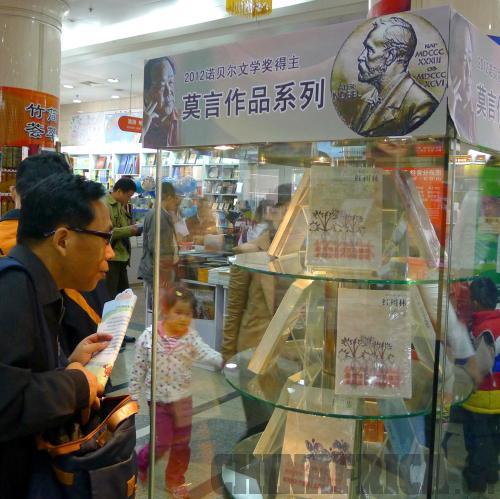|
 |
|
ADMIRING MO'S BOOKS: Bookstores across China have been showcasing Mo's works since his normination |
Achieving Fame
In 1988, Chinese film director Zhang Yimou turned Mo's 1987 novel Red Sorghum into a movie, which won the top prize at the Berlin International Film Festival and made both of them famous.
Set in the 1930s against the backdrop of the War of Resistance Against Japanese Aggression, Red Sorghum is a tale of love and peasant struggles. The main characters "my grandpa" and "my grandma" organize the villagers to combat the Japanese with the simplest of weapons. The passion and vitality exuded by these characters attracted Zhang, and he decided to turn the novel into a film.
The film turned out to be a success, and sales of the novel shot up. Red Sorghum is praised for its unconstrained imagination and smooth flow of language. It praises the power of life and upholds the nationalistic spirit, and provides a fresh look to contemporary war novels.
'Don't speak'
Mo first captured the attention of the literary world with his novella Transparent Red Radish, published in 1985. The "red radish" is symbolic of both sex and food, and hunger inspired Mo to write. As a kid, he knew he wanted to be a writer because a writer could eat three meals of dumplings a day, he was told. As a child, Mo suffered through the 1960s famine, during which time the village children ate whatever they could get their hands on, including tree leaves, insects, mud and coal.
Red Sorghum expresses his thoughts on history and love, and The Republic of Wine embodies his regret for the degeneration of mankind and his hatred for corrupt officials. Although the novels are quite different in content, they both reflect a hungry child's longing for a good life.
Mo was born in the 1950s in a small village in Gaomi, a county with a history of more than 2,200 years, and well known for its traditional folk arts and its production of many celebrities. Mo often returns home to write and most of his novels are set in his home village.
Mo dropped out of school during the "Cultural Revolution" (1966-76) and worked on a farm, where the cows became his friends. "I understood more about cows than about human beings. I knew what they were thinking."
During that time he developed the habit of talking to himself. His mother thought he was sick when one day she found he was mumbling in front of a tree. His mother begged him to stop talking in public. That is why he gave himself the pseudonym "Mo Yan," meaning "don't speak" in Chinese, when he began writing.
Words on paper
"Writing is another way of speaking. I write because I want to share my ideas and thoughts with my friends by telling stories. In the process of writing, I have known more about myself and human nature," Mo said.
Writing also enables Mo to do what he dares not do in real life. He is brave in revealing and criticizing the dark side of society in his works, which has angered some people.
But in daily life, he is careful and considerate, often fearful of upsetting others. "My daughter lives near the Beijing Capital Airport. Every time I come to Beijing, I won't head straight to her home after I get off the plane. Instead, I always ask the taxi driver to take me to the city center for fear of annoying him by traveling such a short distance. Maybe the more cowardly a writer is in real life, the more brave he is in his works," Mo said. "Literature enables us to do what we dare not do and cannot do in reality."
"In my earlier writings, I wrote about miseries inflicted by the outside world, focusing more on the evils of society. Now I pay more attention to the evils hidden deep in my heart," he added. |